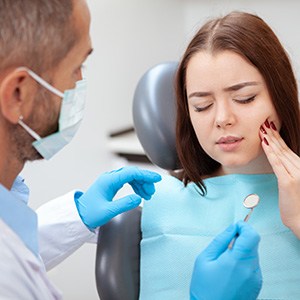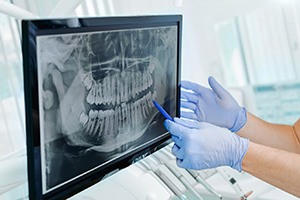
Emergency Dentistry – Westborough, MA
Top-Quality Dental Care in Your Hour of Need

No one ever plans on experiencing a dental emergency, but they do arise. They can happen to anyone, even individuals who do their best to take care of their teeth and gums. If you ever find yourself suffering from a sudden and unexpected dental problem, give us a call right away. We will arrange our schedule to see you as soon as possible — probably even on the same day that you contact us. Our goal is to quickly relieve your pain and get you back on the road to sound oral health with emergency dentistry in Westborough.
Why Choose All Dental for Emergency Dentistry?
- Same-Day & Weekend Emergency Appointments
- General Dentists & Specialists On-Staff
- Quick & Compassionate Dental Care
How We Treat Dental Emergencies

- Call Our Office: Dental emergencies can be stressful to handle, but so long as you have our phone number on-hand, our team at All Dental will be there to care for you! Give us a call and we will provide you with over-the-phone first aid guidance and schedule an appointment for you the same day you reach out. That way, we can ease your pain as soon as possible!
- Come in for an Examination: When you arrive at our office, you’ll be immediately taken back to one of our exam rooms and seen by our emergency dentist in Westborough. We may capture X-rays, and our emergency dentist will conduct a visual examination to diagnose the issue at hand.
- Get Treated: Once a diagnosis has been made, our team will walk you through our recommended treatment plan and a detailed cost estimate. Depending on the necessary procedure, we may be able to complete the treatment the same day, or we may need to schedule it for a later date. In any case, we’ll make sure you’re not in pain when you leave our office!
The Most Common Dental Emergencies
When you experience a dental emergency, one of the first things you should do is call us so we can provide you with professional care. Before your dental appointment, however, there may also be a few things you can do on your own to lessen your pain and minimize the damage to your oral health. We’ll provide you with these details over the phone.
Understanding the Cost of Dental Emergencies

The cost of treating your dental emergency will depend on the exact nature of the problem at hand. For example, if you simply need an antibiotic prescription, it will cost less than if you require an extensive procedure, like a crown or root canal treatment. We will give you an upfront estimate of the cost of your treatment, and we will help you explore how financing and insurance could help you manage your financial obligation.
Keys to Preventing Dental Emergencies

Use the following tips to reduce the chances that you will face a dental emergency:
- Brush your teeth twice a day, and floss once a day.
- Always wear a custom mouthguard when you play sports.
- Attend twice-yearly checkups with your dentist, and undergo any recommended treatment as soon as possible.
- Do not use your teeth as a tool to open packages or trim your fingernails.
- Eat a balanced diet that is low in sugar.
Emergency Dentistry FAQs

Our Westborough team always does what we can to accommodate urgent cases ASAP. Before you decide to trust us with your emergency dental care, though, you might want to learn more about this aspect of oral health and how you can handle various situations. Below, you will find answers to some relevant FAQs. If your specific questions are not addressed here, give us a call. We will be happy to chat with you!
Will My Toothache Go Away on Its Own?
Teeth cannot heal themselves, so your toothache is unlikely to go away on its own. However, there are a few exceptions to the rule.
- The pain is coming from near a tooth, rather than the tooth itself. Food lodged around a tooth, sinus congestion, and minor gum injuries can all cause oral pain. As soon as the cause of the discomfort is addressed, any related toothache should start to subside.
- A tooth dies. A severe infection may cause the nerve inside a tooth to die, rendering it incapable of transmitting pain signals to your brain. However, the original infection can continue to spread and damage nearby tissues.
How Should I Sleep with Tooth Pain?
Tooth pain can seem worse at night! Here are some tips that might reduce your discomfort and help you sleep:
- Take painkillers, such as ibuprofen or acetaminophen.
- Keep your head elevated to prevent blood from rushing to your head and worsening your toothache.
- Apply a cold compress. (Do not fall asleep while using this. Apply it for 20 minutes or so just before bed.)
- Avoid eating crunchy, hard, or acidic foods, especially just before bedtime.
My Chipped Tooth Does Not Hurt. Do I Still Need to Visit?
Even if a chipped tooth does not hurt, it would still be wise to visit us as soon as your schedule allows. Without prompt treatment, the damage to the tooth could worsen. Plus, we should check to see if any of the tooth’s interior layers were damaged when you chipped it.
What Does Chronic Bad Breath Mean?
Chronic bad breath, also known as halitosis, is different from the temporary bad breath that can arise after you eat a pungent meal. Rather, a persistent odor usually indicates an oral or overall health issue. For example, you might have gum disease, an infected tooth, or a large buildup of bacteria on your tongue. Our team can help you identify why your breath smells bad and recommend your next steps.
Preventive Dentistry Restorative Dentistry Dental Implants Cosmetic Dentistry Orthodontics View Our Services